PREVIOUS: How to Help Kids Love Quran and Sunnah (without forcing it on them)
This post is sponsored by Quran Star Lamp
Use "AYEINA15" code for 15% discount.
When people learn something new, they need help. Just as in school or college, a student needs help with paper, so at the beginning of the journey of learning the Qur’an, it is important to have a mentor by his side. When my daughter turned 5 years old, we started our Quran recitation journey. Ramadan came in between which motivated her to finish her Quran within 5 months alhamdulillah. Before 5, we solely focused on Arabic letters and Qaida (a book for beginners to learn how to read Quranic Arabic). Every Islamic store has one. Or you can download and print FREE Qaida pdf (in English or Urdu).
Things to do before starting the Quran:
Imagine the reward of just teaching Surah Fatiha to your child and them reading that Surah in each Salah for many many years beyond you too (in shaa Allah). That makes it at least 17 times a day (with fard Salah – 5 obligatory prayers: 2 rak’ah in Fajr, 4 in Dhuhr, 4 in Asr, 3 in Maghrib and 4 in ‘Isha). That’s more than 500 times recitation of just Surah Fatiha in a month. Now imagine teaching them the whole Quran. And then imagine THEM teaching the Quran (that YOU taught them) to others! It is beyond imagination, isn’t it!?! I am starting with this statement because your passion is their main step forward towards this beautiful journey!
1. Understand your child’s nature and bond with them outside the Quran time too
It’s no secret that to make a child love something, you have to teach it with love. Sometimes that tone of love and connection is formed throughout our days (and months) which helps us bring that same love (and perhaps some more) in the Quran time. And the closer you are to your child, the more you’ll understand them and the more you’ll get to know their nature, the more customized you can make their Quran education. No one truly knows your child like you, as a parent, do! You live with them day in and day out. You know what makes them sad, angry, happy, worried, excited, scared etc. Use that existing knowledge of your child’s nature to your advantage.
2. Help them fall in love with Allah and the Quran
I hope that THIS ARTICLE may help you with instilling love of Quran and Sunnah in your child’s heart in shaa Allah so they are motivated to start their life-long journey.
3. Practice what you teach – be their role model and provide other good role models around them too
Young kids are highly influenced by their parents. As they grow older, they may get influenced by their peers more. No matter what, a home is a place where they constantly come back to so the more the parents walk their talk, the more trustworthy they become. When you force your child to read the Quran next time, ask yourself when was the last time you read it and tried to understand it yourself? Let them hear you reciting Quran out loud or rocking them to sleep with the Quran. Make sure that Quran is heard daily in your homes and read often. Learn basic tajweed yourself too. I know this may feel like a long journey where you will first learn and then teach your child, but just like walking the talk, this step is essential. You want your child to recite the Quran correctly and it’s good to set the same standards for yourself too. I know you may take more time than them, but I pray that Allah rewards you in the form of your kids bonding with the Quran as a result. In the start, basic pronunciation may be enough too. You may also learn advanced tajweed WHILE teaching your child. My kids visit their paternal grandparents every evening as I live right across the joint-family system and their paternal uncle and aunt both revise their hifdh lessons at maghrib time so having other role models around the kids helps their motivation level too.
4. Listen to the Quran often and make it a part of your daily routine
Start and end your day with the Quran. You will notice how your child will start accepting it as a natural part of the home environment – especially if they are started on this habit from a very young age. I remember a woman once came with her few-months-old baby and said: “my child finished the Quran” and we were really confused as to what she was talking about. She explained that the child just finished listening to the Quran from cover to cover. Our surprised expressions melted into deep warmth. Our children deserve to discover, love and be protected and guided by these Divine words.
Narrated `Abdullah bin Mas`ud رضي الله عنه: The Prophet (ﷺ) said to me, “Recite (the Qur’an) to me.” I said, “O Allah’s Messenger (ﷺ) Shall I recite (the Qur’an) to you while it has been revealed to you?” He said, “Yes.” So I recited Surat-An-Nisa’ (The Women), but when I recited the Verse: ‘How (will it be) then when We bring from each nation a witness and We bring you (O Muhammad) as a witness against these people.’ (4.41) He said, “Enough for the present,” I looked at him and behold! His eyes were overflowing with tears. [Sahih al-Bukhari 5050]
5. Don’t push if they are not willing, rather get creative
If your child is not ready at the age of 5, forcing them to start reading the Quran may backfire. But instead of giving up altogether, think of creative ways through which you can motivate them. I remember a mother saying that the thing that worked best for keeping up interest of her child was using her stuffed toys as her classmates. In the beginning, her daughter would repeat after her (the mother) and the daughter would make her (stuffed toys) classmates repeat after her. As her daughter gained confidence, she started leading the class. It maintained the enthusiasm of her daughter. So whatever piques your child’s interest, use that to your advantage.
I remember how my 5 yr old once started crying after she got the word wrong over and over. I hugged her, put her in my lap and said: “Ok! Let’s make dua to Allah together”. I asked her to simply repeat after me as she was still in her crying phase. I cupped her hands in mine and said: “Ya Allah! Please teach me your words so I can recite them and understand what you are saying to me.” She kept repeating after me as I continued…”O my Lord! I want to recite the Quran in a beaaaauuuutiful voice so you can listen to me too as you listened to your Prophets” (based on the following hadith I had already told her).
Narrated Abu Huraira: that he heard the Prophet (ﷺ) saying, “Allah does not listen to anything as He listens to the recitation of the Qur’an by a Prophet who recites it in attractive audible sweet sounding voice.” [Bukhari 7544]
Then I continued with “Ya Allah! I want to recite the Quran with ama so angels can wrap us with their laaaaaaaarge wings” (and I wrapped my arms around her after which she started giggling and said a big AAMEEEEENNNN).
The Messenger of Allah ﷺ said, “When a group of people assemble for the remembrance of Allah, the angels surround them (with their wings), (Allah’s) mercy envelops them, Sakinah, or tranquillity descends upon them and Allah makes a mention of them before those who are near Him.” [Riyad as-Salihin 1448]
6. Make sure that the Qaida is completely done before you start the Quran
And of course, make sure that they know their Arabic letters before you start the Qaida. There are several different Qaidas on the market. Some feature the ‘Uthmani script (used in Madina Mus-haf) while some use Indo-pak script. The latter has more harakaat (signs) on them than the former so it may be easier for a child because it has more visual clues. But a child can also do great once he/she has practiced the ‘Uthmani script. See what works best for your child and stick with it. Quran Star Lamp has Qaida audio embedded which can help speed your child’s progress in shaa Allah.
Things to do when starting the Quran:
When you think that your child is ready to recite the Quran now, I hope the following pointers help along with the FREE Quran Lesson Plan printable above to help you divide the lessons into meaningful divisions (verses that tie together with each other):
1. Help them understand their WHY (reason behind such hard work)
This is HARD work for kids. They are going to recite an entirely new language (even if you are an Arab, you may notice that the (‘aami/modern standard) Arabic you speak is different from the (fus’ha/classical) Arabic you read in the Quran). So give them the reasons to stay excited and keep reminding them of their (and even your) purpose in this world. I remember the time when my 5yr old started crying because she couldn’t recite the Quran in a beautiful tone (she loves listening to Qari Mishari and imitating his tone). I said to her while wiping her tears: “Do you remember the hadith we read about the one who recites Quran beautifully and gets a beautiful reward?” She then completed the hadith while half smiling half crying: “And the one who recites with difficulty gets the double reward”. I smiled and asked: “so what is my baby getting right now (in shaa Allah)?”. She smiled, wiped her tears and finished her line. Then I told her that we can do the rest tomorrow now (because we, as parents, can understand our child’s capacity the best).
The Prophet ﷺ said, “Such a person who recites the Qur’an and masters it by heart, will be with the noble righteous scribes (in Heaven). And such a person who exerts himself to learn the Qur’an by heart, and recites it with great difficulty, will have a double reward.” [Sahih al-Bukhari 4937]
2. Teach it with patience and keep practicing because it’s not a race
You may break the whole process down step by step making it easy to follow for the child. You may feel stretched and as a result, you may want quick results, but know that a child will take time and that’s completely OK! We need to let kids know that their efforts matter with Allah even if they are not able to achieve the desired result with that effort. Growth mindset is all about knowing that we can achieve anything with the help of Allah if we are willing to put more effort in it.
“So whosoever does good equal to the weight of an atom (or a small ant), shall see it.” [Quran; 99:07]
3. Put them in your lap to teach and listen
I remember whenever my child would make constant mistakes, I used to get really frustrated. Then I started putting her in my lap as she recited the Quran. I would either hug her and go through the Quran with her while putting my face over her shoulders. If I knew the parts of the Quran she was reciting, then I would just brush her hair or make her braid while correcting her mistakes. The physical closeness made it hard for me to get angry at her mistakes. She had Quran in her lap and I had her in mine 💞
4. Stay consistent, but not rigid
Say to your child “Yes! You can do it!”. Have a glass of water beside them. Keep using encouraging words to help them keep going and believe in their abilities. I used to ask my daughter to just finish the verses that relate to each other. Sometimes I used to tell her to not count the pages and keep reading. If she gets tired, she can leave it, but she shouldn’t count because it will make her tired before she’s ACTUALLY tired. Not sure if it makes sense, but we can’t keep counting our steps while feeling each is a burden to take. Seeing the finish line helps indeed, but most days we did not put any boundary on the amount of Quran we would recite and we ended up doing way more than what I would have in mind for that day alhamdulillah.

5. Have a morning routine so you are at your best energy level
With time, everyone at home now knows that Quran comes first and then they can do whatever they like to do afterwards. We often repeat this phrase in our home “Allah first. Then everything else.” – so much so that whenever I’m getting ready to pray, if one of my child would need me at that moment, another would remind her that Allah first, then everything else (which helps me pray in peace too alhamdulillah). Mornings have barakah. And you have a fresh mind (the most fresh you can be throughout the entire day). You are also well-rested. But if you feel that you are going to get frustrated because of lack of sleep (or whatever reason there may be) then take a break and come back to it when both parties feel ready. When my 5yr old got good hold of her recitation, I used to give the duty of her lesson to my eldest daughter (who is memorizing the Quran) – especially when the house chores or my youngest one would demand my attention more.
6. Don’t compare because your child is unique and has his/her own strengths
Their cousins, peers, friends, age-mates are all different kids with different personality traits/ strengths and weaknesses – raised by different parents in different environments so don’t compare their progress with anyone but themselves. They should make progress from what they did yesterday. And that should be your main focus. Your child should be giving THEIR best, not someone else’s best. Instead of shaming them, empathize with them while still motivating them to do their best. And remember, your child’s best may be entirely different from the kind of best you have in mind so stay flexible as well.
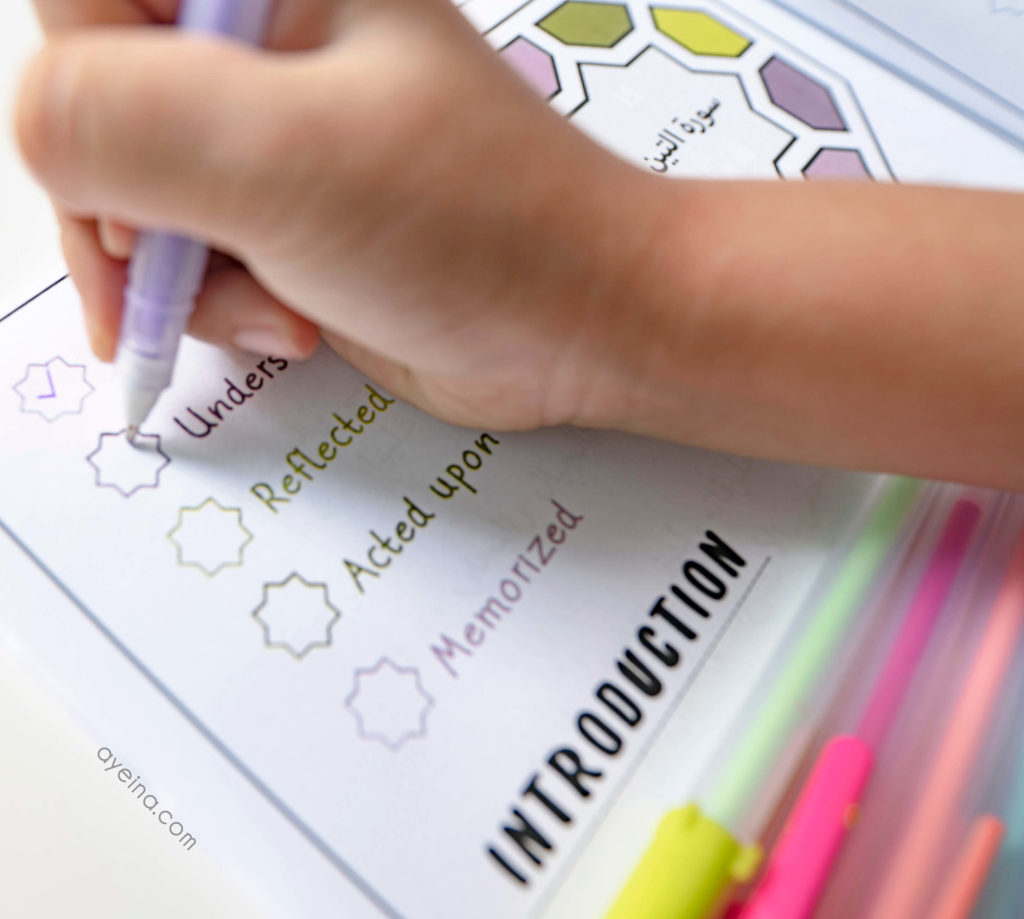
7. Set goals for your child WITH your child
Quran is a book for life. It’s a divine book that contains His words, stories and many solutions to life’s most intricate problems. It’s children’s guide today, tomorrow and even when we are long gone. Give your child the Quran, and the Quran will teach them all that they need to know. Ask them where do they see themselves with the Quran? And tell them the following hadith so they can aim as high as they can!
Messenger of Allah (ﷺ) said: “It will be said to the companion of the Qur’an, when he enters Paradise: ‘Recite and rise one degree for every Verse,’ until he recites the last thing that he knows.” [Sunan Ibn Majah 3780]
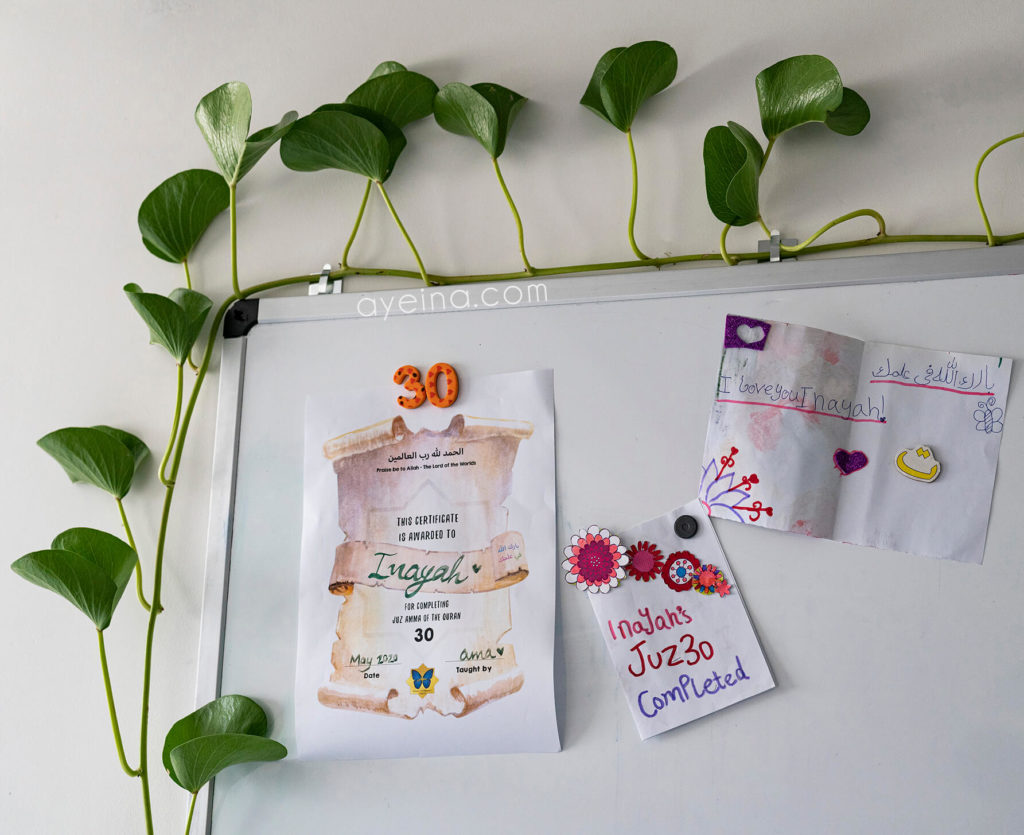
8. Encourage them along the way with positive affirmations or gifts if necessary
Reward stickers are a good way to excite children about their learning progress once they have mastered a certain tajweed rule or completed a Surah. Some people give ice cream after each lesson or a chocolate, toys, books, handmade gifts etc. Whatever gift that you think would encourage your child, go for it. My daughter loves flowers and plants so that’s what I gifted her in first five of the Juz. Now she has many plants to look after – which was not only a great gift, it was also an awesome responsibility to give to her. Her plants are thriving now alhamdulillah and she calls herself a farmer. After that, I spaced out the gifts and gave her bigger goals to achieve. For some children, positive remarks focusing on their effort, quality time with a parent, or overhearing you “bragging” about him/her to a close family member is enough. So something like, “You worked so hard on that! Give me a high five! Let’s play your favorite game now or read your favorite book. You know, you earned so many hasanaat by reading that! I can’t wait to see what gifts Allah has waiting for you”. Observe the child to see how often he/she needs encouragement and offer it verbally, positively, genuinely and with enthusiasm. Giving and displaying kids’ certificates are also a great way to encourage them without having to spend on monetary rewards.
Although rewards can sometimes take away from the child’s intrinsic motivation and satisfaction with accomplished goals. Children can become dependent on rewards so you know your child and family best. Decide based on what works and what doesn’t.
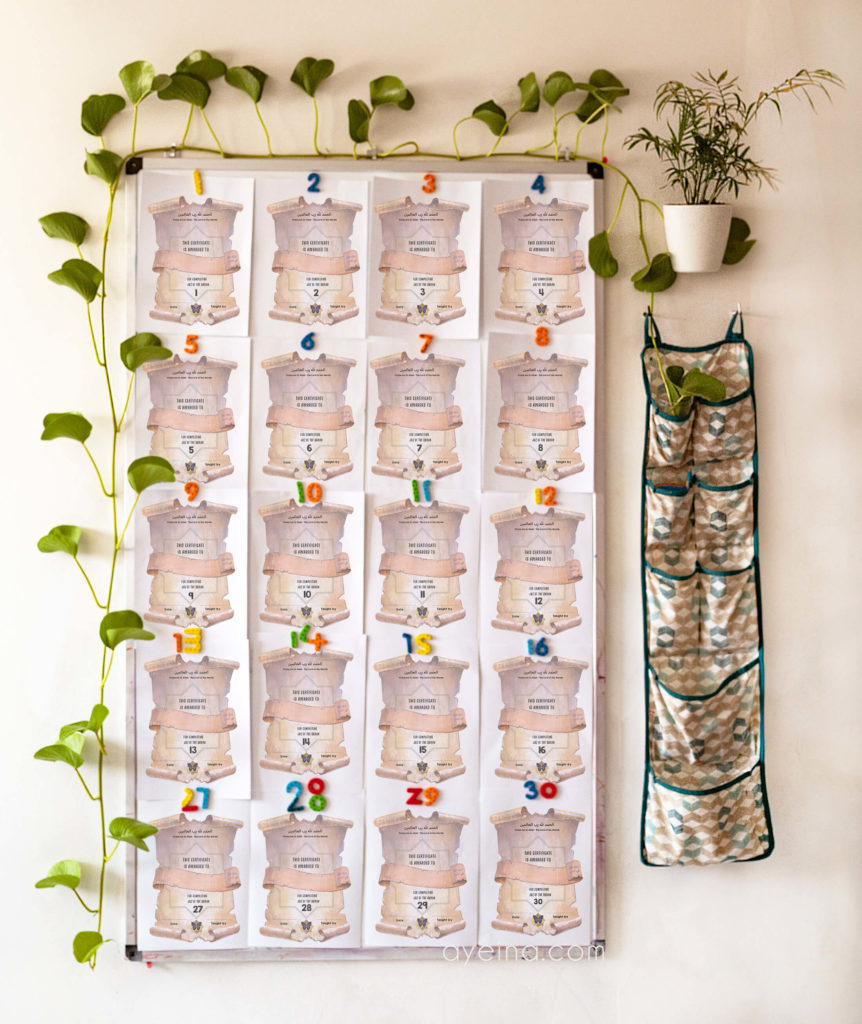
9. Celebrate their achievements like they are your own (because they are)
We used to make a big deal out of it when my 5yr old would finish a Juz by bursting into a loud roar and 5yr old would just run around the house in celebration. I remember the excitement in her voice as she was reciting the last few verses of her last Juz. As soon as she finished, we all went into a loud roar of the longest (and probably most annoying) “yayyy ayyyy ayyyy” ever. Siblings joined in for the roar too. We then ended our Quran journey with a special pink cake (her favorite). And of course, the journey of the Quran never really comes to an end. This was just a milestone and many more to come in shaa Allah.

10. Make dua for them and for yourself too
What you teach your child today may have a lifelong effect which may run through their generations as well. Imagine the amount of rewards. Plant the seed today and allow Allah to help you in seeing that seed grow with His words. Your duas matter. Not just for your child, but for yourself too. May Allah accepts your efforts. So your children turn to Quran before they turn to you. May they develop a life-long relationship with it and they become your sadaqah jaariyah as a result 💖
How did you teach your child the Quran? Leave your ideas below and we can add your suggestions as well. May Allah make it sadaqah jaariyah for you.






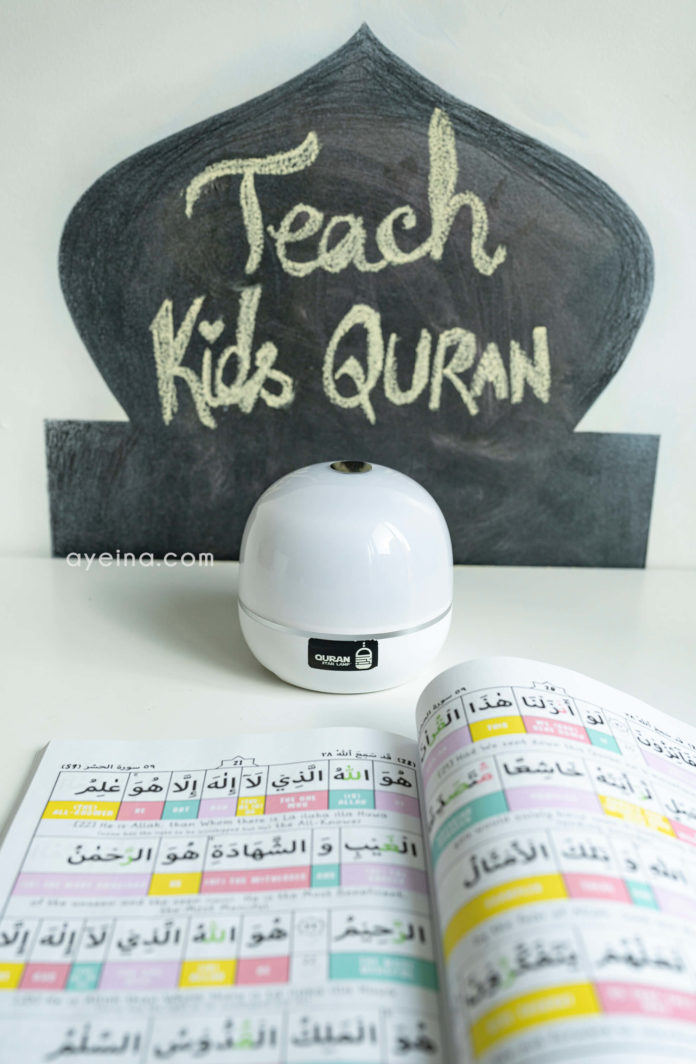




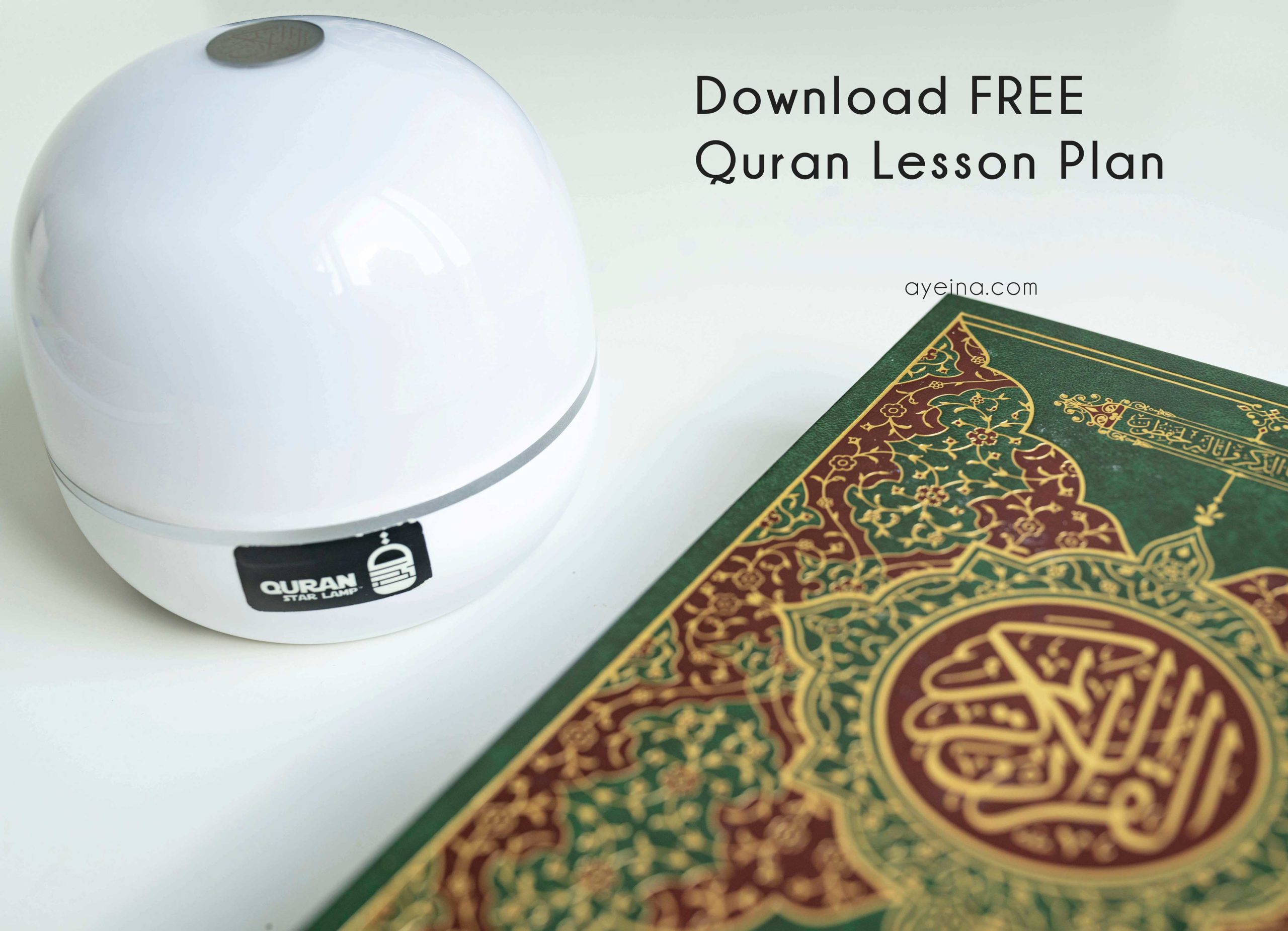

Salaam! Jazakillah Khayr for this article, it’s really beneficial! May Allah reward you for it immensely!
I have a 5.5 year old boy who used to be very enthusiastic about reciting and memorizing the Quran but we moved to another country and both parents got really busy with our work/studies so my son goes to school and daycare and hardly gets a few hours a day with us. It’s hard to push him to read the Quran at that time especially as he feels exhausted and frustrated and I don’t want him to project those feelings on the Quran. So we only get to read it over the weekends with him which makes me extremely sad and lost at how to help him fall in love with Allah and His book and Messenger.
InshaAllah, will try to implement these steps as well. Please make dua for us! <3
Walaikum assalam. May Allah make it easy for you sis. Kids are on fitrah (natural inclination – towards these things) and our job is to simply nurture it. If he had the enthusiasm once, in shaa Allah it will come back <3
Assalamu alaikum sister,
Great article. Jazakillah khair. In sha’Allah your daughter will stay firmly connected with the Qur’an and continue to enjoy her lifelong journey of learning.
With my kids, in addition to teaching them Qur’an at home, I found it very beneficial for them to attend madrassa from this age. They all started at 5 with weekend morning madrassa and then attended weekdays after school for 2 hours when they got a bit older. Alhamdulilah! It really helped them to become accustomed to being with other Muslim kids in a single gender environment where manners and good behaviour were insisted upon, and even helped them accept and love the Muslim dress code.
Walaikum assalam. Aameen to your kind duas. Alhamdulillah, righteous company is gold. I hope your kids build lifelong good friendships with their madrassa peers <3
Masha Allah, Jazakumullahu khair. It’s really a motivational piece, i’ll put it into action in shaa Allah, May Allah makw it easy for us, ameen
aameen <3 jazakillah khairan katheera!
This is such a lovely informative article. I don’t have children of my own, I’m sure one day I’ll definitely need this post. I will be sharing it with my friends who have children learning Quraan, I’m sure this will be very helpful. (www.spicyfusionkitchen.com)
mashaAllah so inspirational!!
Keep the good work up! May Allah SWT bless this Ummah with more moms like you! Ameen.
JazakumAllah hu khayran katheera for the beautiful tips.
We have a 4 yr old boy, and have to work with him soon inshaAllah for Quran Paak.
BaarakAllahu lak sis. May Allah help you through this journey and reward you for your efforts <3
Masha Allah
it’s very inspiring
keep it up
الاعتكاف وليلة
I am struggling with my 5 zyear old to make him learn Quran
Please remember me and my son in your prayers
Inshallah I will try to follow the techniques you have beautifully mentioned in your blog
Mashallah, very good article. No words for praise. Your words are written in golden water
Hi dear sister. Thank you for the great article. What is the name of the bbook in the first pic? Is it good for preschoolers?
You mean juz journals? https://ayeina.com/juz-journals-quran-for-kids/ I personally started using it with my daughter when she was 5. Hope it helps you too sis 🙂
Subhan ALLAH its a beautiful post i will share this post in my friends and circle
Masha’allah,
One of the points I also noticed when they you build a good relationship with kids and be friendly with them, it makes the difference!
MashaALLAH great article keep it up
introducing OneUmmaah where muslims around the world can socialize and connect with each singup now on oneummaah . com and join the community